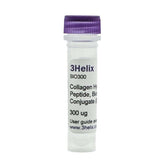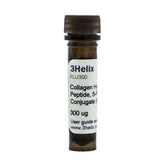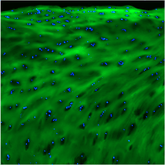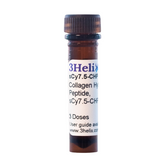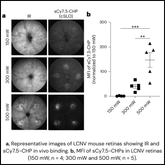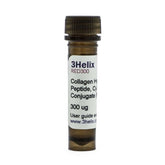Localization of Therapeutic Fab-CHP Conjugates to Sites of Denatured Collagen for the Treatment of Rheumatoid Arthritis
09 Jan 2024
0 Comments
In a recently accepted article published in Bioconjugate Chemistry, researchers from the University of Utah used CHPs in an antibody-conjugate to address Rheumatoid Arthritis(RA). In this paper, the authors used the Fab region from infliximab (an anti-TNFα therapy known as Remicade®) and conjugated this with CHPs.

Figure Caption. A) Biodistribution of IR680 labeled bFab-(NIRF)CHP (Target) and caged bFab-(NIRF)CHPNB (Control) IV injected into the tail vein of nude mice (n=5). B) Fluorescence intensities were quantified over 10 days by whole-body scan. Data reported as mean ± standard deviation C) Mice were sacrificed and NIRF intensity was measured for isolated organs. Both target and control were processed primarily by the liver, while bFab-(NIRF)CHP showed significantly greater skeletal localization. (Li: liver, K: kidney, Sk: skin, H: heart, Lu: lung, S: spleen). Statistical significance is defined as follows: †P<0.001; ‡P<0.0001.
Numerous ELISA-like assays were used to verify the binding of the novel Fab-CHP was maintained, they tested the ability of Fab to bind TNFα and the ability of the CHP to bind with denatured collagen. The therapeutic efficacy and initial biodistribution were tested in Vivo using transgenic mice that expressed human TNFα (hTNFα) and their results confirmed that the Fab-CHP remained at the target sites for longer than the controls. Additionally, terminal histological sections were taken from arthritic joints and evaluated using H&E and Safranin-O staining. Overall, the researchers confirmed successful conjugation of Fab-CHPs, showed that Fab-CHPs maintained their affinity to bind with denatured collagen (CHPs) and hTNFα (Fab), and most importantly, the results showed that Fab-CHPs slowed the progression of RA and maintained healthy cartilage. They acknowledge that more work must be done to optimize the Fab-CHP platform but these results are very promising for other antibody-CHP conjugates.
ABSTRACT
Rheumatoid arthritis (RA) is an autoimmune disease characterized by chronic inflammation in synovial joints and protease-induced cartilage degradation. Current biologic treatments for RA can effectively reduce symptoms, primarily by neutralizing the proinflammatory cytokine TNFα; however, continued, indiscriminate over-inhibition of inflammatory factors can significantly weaken the host immune system, leading to opportunistic infections and interrupting treatment. We hypothesize that localizing anti-TNFα therapeutics to denatured collagen (dCol) present at arthritic joints, via conjugation with collagen-hybridizing peptides (CHPs), will reduce off-site antigen binding and maintain local immunosuppression. We isolated the antigen-binding fragment of the clinically approved anti-TNFα therapeutic infliximab (iFab) and prepared iFab-CHP conjugates via lysine-based conjugation with an SMCC linker. After successful conjugation, confirmed by LC-MS, the binding affinity of iFab-CHP was characterized by ELISA-like assays, which show comparable antigen binding relative to infliximab, comparable dCol binding relative to CHP, and the hybrid ability to bind both dCol and TNFα simultaneously. We further demonstrated localization of Fab-CHP to areas of high dCol in vivo and promising therapeutic efficacy, assessed by histological staining (Safranin-O and H&E), in a pilot mouse study.
Continue reading the full paper
Tags:
